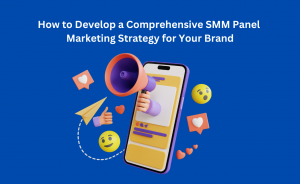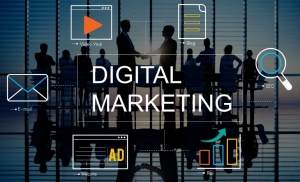Sustainability is not merely trendy but a core value in today's world. Customers are becoming aware of how their decisions affect the earth, and they are increasingly willing to pay for brands that share their values. Among the most influential factors leading to a buying decision are ethical sourcing, eco-friendly production, transparency, and social responsibility. Such a change has offered a huge growth potential for sustainable and ethical brands. However, these brands still struggle to break through the noise in highly competitive markets.
Digital marketing is the answer to this problem. In contrast to conventional marketing, digital channels provide an opportunity for brands to share their values in-depth, genuine, and accurate manner. They allow companies to connect with "care" audiences, to inform customers about their mission, and to build communities around the purpose. To tell a story is the function of digital marketing to be used by the sustainable brands, not merely a promotion tool. It is a bridge from intention to impact.
The brands will be the ones to win if they choose to use digital marketing strategically in their mission as the awareness of the issue grows and the demand for ethical products escalates. We can learn how digital marketing helps the sustainable growth and why it is so important in this new consumer landscape by exploring it.
Creating a Voice That Stands Out
Most times, sustainable and ethical brands have to fight the battle of markets that are already taken and dominated by big companies with a lot of capital. What typically distinguishes them from one another is not necessarily the product but the reason for the existence of the product. With digital marketing, these brands are able to establish a brand voice that is different from others and which addresses directly the needs of conscious consumers who are looking for transparency and responsibility.
By engaging storytelling, brands get an opportunity to explain the concepts of their products: not only the materials used but also the communities being supported and the positive effects that will last for a long time and will be created from these products. Documents, videos, and social posts along with campaigns become a vehicle which helps to transfer the brand's mission to the audience. When digital storytelling is done right, it gives the brand a human face and hence emotional connection as well as loyalty of the people concerned will be established.
Authenticity in this case is even more crucial. The consumers of today can immediately detect fake marketing. They call for brands to give proofs for the promises they make. Various digital channels provide eco-friendly companies with opportunities to corroborate their statements through different means such as by showing the certification, providing the real view, interview with the founder or farmer, and giving some data on the environmental impact. Such proof is the foundation of trust which an ethical brand is very dependent on.
Reaching the Right Audience at the Right Time
Sustainability brands are in a better position as their audience is very deliberate. Conscious consumers are always looking for better alternatives; they research brands thoroughly and they engage with the content that educates and empowers them. Digital marketing allows brands to be visible exactly when and where these consumers are starting their search.
Targeted advertising, clever SEO, inbound content strategies, and social engagement are some of the ways brands get to the people who already care about sustainability. As conscious consumers are usually passionate about their values, they also share content, write reviews, and recommend brands in their communities. Digital marketing supports this organic growth by speeding up the discovery process.
This is quite a significant advantage for brands that do not have the capacity to compete with large advertising budgets for the mass-market. Instead of advertising to everyone, they can make a strategic decision on investing in reaching the people who are most likely to resonate with their values.
Educating Consumers and Unpacking Complex Concepts
Often, socially responsible and eco-friendly brands are in sectors that require a lot of educating. In any case, it is necessary to explain the carbon footprint, supply chain transparency, vegan materials, circular production, fair labor practices, or green certifications to the consumers, who need support to understand what makes a product truly sustainable.
Online marketing is an ideal vehicle for instruction. Companies can take complicated ideas and make them understandable through appealing visuals, interactive content, infographics, and educational campaigns. Such activities not only create trust but also competently position the brand as an expert and leader in its category.
Besides that, if buyers comprehend the worth behind the price, they will be more inclined to purchase ethically made products even at a higher price. Education is what closes the gap between perception and value, thus, converting awareness into action.
Building Stronger Communities and Customer Relationships
Environmentally-friendly brands are most effective in expanding their business when they establish communities that have common values. The use of digital marketing helps in the brand becoming the customer's advocate. Indeed, brands can use social media, newsletters, online events, and community campaigns to go beyond the simple transaction and foster meaningful engagement with their customers.
After all, a community-driven approach encourages both conversation and connection. Customers really think that they are helping to create a better world, be it through waste reduction, a support for artisans, or the improvement of the environment. This emotional bond is, in fact, one of the most powerful factors that underpin brand loyalty in the long run.
Influencers, therefore, have a great impact on the situation here. Most of the time, ethical brands collaborate with content creators who are devoted to the brand's mission. These relationships, at the same time, open the brand to new customers and keep the authenticity and trust intact. Influencers, thus, become the community's link by both engaging and exposing the brand to the community.
Midpoint: Leveraging Advanced Advertising Tools for Conscious Growth
When a sustainable brand grows, digital marketing is still more necessary. A lot of businesses get to such a level where they cannot rely on organic content and community engagement alone for their growth. At this point, they start looking into more advanced paid advertising strategies that not only correspond to their principles but also increase their reach and visibility.
That's the point at which local knowledge of the market is very helpful. Some brands decide to get specialized partners support, use regional targeting strategies or platforms that enable them to reach conscious consumers in a more effective way. Quite often at this stage, sustainable companies decide to look into refined targeting, local markets they are most interested in or consider moving to the different parts of the world which are known for being digitally advanced.
During this strategic shift, many businesses begin researching tools, partners, or agencies that can support precise paid growth sometimes discovering specialized platforms like Google Ads UAE to help them elevate their visibility in competitive markets. This expansion phase marks the turning point where sustainability-focused brands begin embracing digital advertising as a controlled, scalable channel for long-term growth.
Using Analytics to Make Smarter, Ethical Decisions
Being sustainable isn't only about the materials and the process; it's also about making wiser, more aware business decisions. Digital marketing offers access to live data which is very helpful for brands to know what their audience likes. Analytics give brands the opportunity to lessen the waste of marketing expenses, to deepen the messaging, and to focus on what actually leads to the impact.
Looking at consumer behavior, engagement patterns, and conversion data, sustainable brands should definitely be able to make the right decisions without having to guess. It cuts down on unnecessary spending while powerfully supporting the meaningful moments throughout the journey. Data turns into a guide for ethical brands to find smarter strategies that are in line with their values and business goals.
Enhancing Transparency Through Open Communication
Without doubt, transparency is what defines a brand that is both environmentally and socially responsible. The use of digital marketing provides firms with the capability of being transparent, empathetic, and truthful with their clients regarding their business. Whichever it may be, sharing challenges, celebrating progress, or acknowledging areas for improvement, transparency is what earns one's trust.
Brands through the use of such means as blogs, videos showing behind-the-scenes of work, Instagram stories, and long-form educational content can bring customers closer to their business. The very fact that a brand is open to everyone is not only very refreshing but also indispensable in a world where greenwashing is very common. Consumers are satisfied when brands tell them the truth even when the news is not good.
This degree of honesty is something that traditional marketing channels are not able to accomplish. Digital platforms bring transparency to the level of being very easy, continuous, and very human.
Supporting Global Impact Through Scalable Growth
As a sustainable brand grows it can have a larger influence. Digital marketing is not only a tool for visibility but also a main driver of the scalable growth which allows brands to extend their ethical practices, recruit in a fair way, innovate in an environmentally friendly manner, and help communities anywhere in the world.
Growth is not the problem with sustainability, misalignment of growth is. When an expansion is carried out with intention, transparency, and strong digital alignment, sustainable brands have the capacity to increase their positive impact exponentially.
Digital marketing is turned into the means by which ethical businesses become visible to more people who are interested. It is a tool that accelerates the impact, makes the possibilities more open, and empowers global movements towards conscious consumption to become stronger.
Conclusion: Digital Marketing Is the Catalyst for Sustainable Brand Growth
As consumers continue to redefine what responsible shopping means, sustainable and ethical brands have a great chance to become popular. However, gaining visibility and increasing one's customer base needs a well-planned communication strategy and digital marketing is the way out.
By investing in storytelling, community-building, education, targeted outreach, data-driven insights, and transparent communication, digital marketing empowers ethical brands to have the momentum with which they can grow in a way that is consistent with their values. It is the tool that ensures that the brands which are making the biggest positive impact are the ones that are also going up.
When sustainability is becoming the new standard rather than the exception, those brands which will be proficient in digital marketing are the ones that will be leading the way to the future of conscious customers one at a time.






